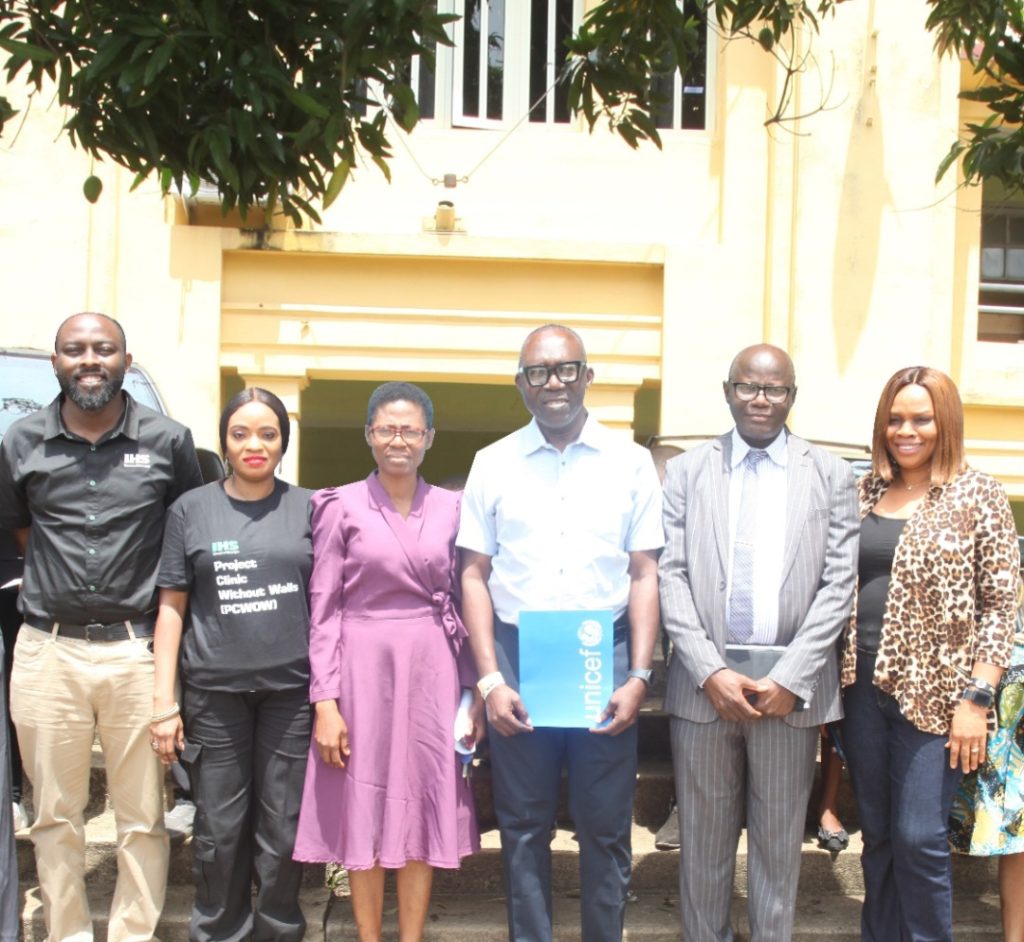
Photo Caption: (L–R) Associate Director, Corporate Communications, IHS Nigeria, Sylva Ifedigbo; Director, Sustainability, IHS Nigeria, Titilope Oguntuga; Commissioner for Health, Oyo State, Dr. Oluwaserimi Adewunmi Ajetunmobi; Health Specialist, UNICEF Lagos, Dr. Olufemi Adeyemi; Permanent Secretary, Oyo State Ministry of Health, Dr. Akintunde Ayinde; and Communications Officer, UNICEF Nigeria, Blessing Ejiofor, during a courtesy visit and inspection of the oxygen plant donated by IHS Nigeria, in collaboration with UNICEF, to Jericho Specialist Hospital in Ibadan, Oyo State, on Wednesday, June 18, 2025.
IHS Nigeria, part of IHS Holding Limited (NYSE: IHS) (“IHS Towers”)—one of the largest independent owners, operators, and developers of shared communications infrastructure in the world by tower count—has continued its impact assessment tour of oxygen plant projects situated in hospitals across the country.
The telecommunications infrastructure company visited Jericho Specialist Hospital in Ibadan, Oyo State, on Wednesday, June 18, 2025, to assess the operational status of the oxygen plant jointly donated with the United Nations Children’s Fund (UNICEF) in May 2024. The donation is part of IHS Nigeria’s commitment to improving Nigeria’s healthcare system through sustainable, impactful initiatives designed to support health facilities across the state.
Prior to touring the facility, the IHS Nigeria and UNICEF team was received at the Oyo State Ministry of Health by the Honorable Commissioner for Health, Dr. Oluwaserimi Adewunmi Ajetunmobi, alongside the Permanent Secretary and other Directors from the Ministry and the Oyo State Hospital Management Board. The visit, led by senior officials from both organizations, provided an opportunity to evaluate the plant’s operational efficiency, integration into critical care delivery, and broader impact on the state’s healthcare infrastructure.
Commenting on the visit, Titilope Oguntuga, Director, Sustainability, IHS Nigeria, remarked:
“At IHS, sustainability is at the core of everything we do. Our focus spans four key pillars: Ethics & Governance, Environment & Climate Change, People & Communities, and Education & Economic Growth. This oxygen plant initiative speaks directly to our commitment to people and communities. As we assess the progress of this project, we are reminded of its alignment with key Sustainable Development Goals, including good health and well-being, responsible consumption, and partnerships for the goals.”
“We are here not just to inspect the plant, but to witness its impact, strengthen relationships, and continue building a partnership that delivers real value to Nigerians,” she added.
Dr. Olufemi Adeyemi, Health Specialist at UNICEF Lagos, commented:
“It is a pleasure to witness the results of our strong collaboration with IHS Nigeria and Oyo State. On behalf of UNICEF, I sincerely thank the state for providing an enabling environment that makes impactful partnerships like this possible. We are here to assess how well the oxygen plant is performing. We no longer want to see lives lost due to a lack of oxygen. We want to be assured that the investment made is truly saving lives and delivering the impact it was intended to.”
Oyo State Commissioner for Health, Dr. Oluwaserimi Adewunmi Ajetunmobi, expressed appreciation for the initiative, saying:
“This partnership between IHS Nigeria and UNICEF is a testament to the power of collaboration in strengthening our healthcare system. The oxygen plant at Jericho Specialist Hospital has become a critical asset in our fight to reduce avoidable deaths, especially among newborns and vulnerable patients. It is not just a donation; it is a life-saving intervention that has redefined emergency response capabilities in the state. We commend IHS Nigeria and UNICEF for their foresight, dedication, and long-term commitment to healthcare delivery in Oyo State.”
Dr. Akintunde Ayinde, Permanent Secretary, Oyo State Ministry of Health, emphasized the broader significance of the intervention:
“Before COVID-19, oxygen therapy was not prioritized in most hospitals—government or private. But when the crisis hit, IHS Nigeria and UNICEF didn’t just donate equipment; they identified the gap and moved quickly to close it. This oxygen plant has completely transformed our emergency response system. We’ve gone from scarcity to stability. Patients who once struggled to access oxygen—especially those who couldn’t afford it—now receive it without delay.”
“Beyond the donation, IHS and UNICEF introduced a sustainability model, trained engineers, and implemented a more efficient, solar-powered oxygen management system. We’re now extending oxygen access to primary and secondary care centers and even supplying private clinics during crises. For me, this initiative is not just impactful—it is lifesaving. We are truly grateful and committed to building on this collaboration to ensure long-term impact,” he added.
The oxygen plant is equipped with 50 units of 6-cubic-meter cylinders and 150 units of 3-cubic-meter cylinders. It currently supplies both public and private hospitals, including primary health centers across Oyo State. Hospital management acknowledged the plant’s critical role in ensuring the timely availability of oxygen—even to facilities unable to pay—and in improving medical outcomes for patients requiring oxygen therapy.
Earlier this year, the IHS Nigeria and UNICEF team visited Olabisi Onabanjo University Teaching Hospital (OOUTH), Sagamu, to evaluate the operational status and impact of the oxygen plant installed in Ogun State.








